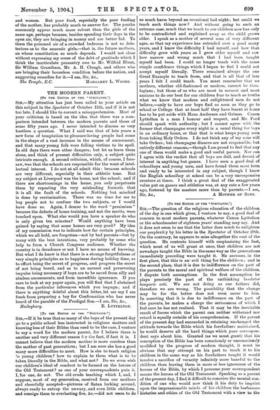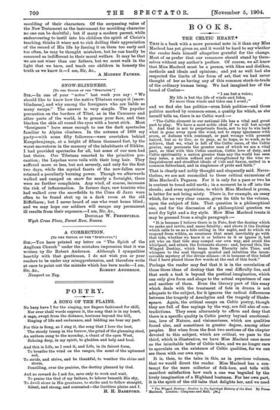SIR,—The question of the religious education of the children of
the day is one which gives, I venture to say, a good deal of concern to most modern parents, whatever Canon Ly-ttelton or the schoolmaster of eighteen years' standing may say. And it does not seem to me that the latter does much to enlighten our perplexity by his letter in the Spectator of October 29th. On the contrary, he appears to miss altogether the root of the question. He contents himself with emphasising the fast, which most of us will grant at once, that children are not nowadays taught the Bible in the same way as the generations immediately preceding were taught it. He assumes, in the first place, that this is an evil thing for the children ; and in the second place, that it is due to indifference on the part of the parents to the moral and spiritual welfare of the children. I dispute both assumptions. In the first assumption he plays precisely the part of the unthinking laudator temporis acti. We are not doing as our fathers did, therefore we are wrong. The possibility that the change may be for the better does not even occur to him. In asserting that it is due to indifference on the part of the parents, he makes a charge the seriousness of which I feel sure he has not realised. That it may be the inevitable result of forces which the parent can neither withstand nor retard is equally outside of his comprehension. If the parent of the present day had succeeded in retaining unchanged the attitude towards the Bible which his forefathers maintained, he would deserve all the hard things which your correspon- dent says about him. Granted (as we must grant) that his conception of the Bible has been consciously or unconsciously modified by the progress of modern thought, it must be obvious that any attempt on his part to teach it to his children in the same way as his forefathers taught it would involve a sacrifice of veracity infinitely more baneful to the children than leaving them in more or less ignorance of the heroes of the Bible, by which I presume your correspondent means the heroes of the Old Testament. Speaking as a parent of the present day, I find it difficult to conceive the mental con- dition of one who would now think it his duty to imprint upon the impressionable minds of his children the barbarous histories and ethics of the Old Testament with a view to the
moulding of their characters. Of the surpassing value of the New Testament as the instrument for moulding character no one can be doubtful ; but if many a modern parent, while endeavouring to instil into his children the spirit of Christ's teaching, thinks it wiser not to risk dulling their appreciation of the record of His life by forcing it on them too early and too often, he may be thought mistaken, but he can hardly be censured as indifferent to their moral welfare. It may be that we are not wiser than our fathers, but we must walk in the light that we have, and teach our children in honesty the truth as we know it.—I am, Sir, &c.,
A MODERN FATHER.



























































 Previous page
Previous page